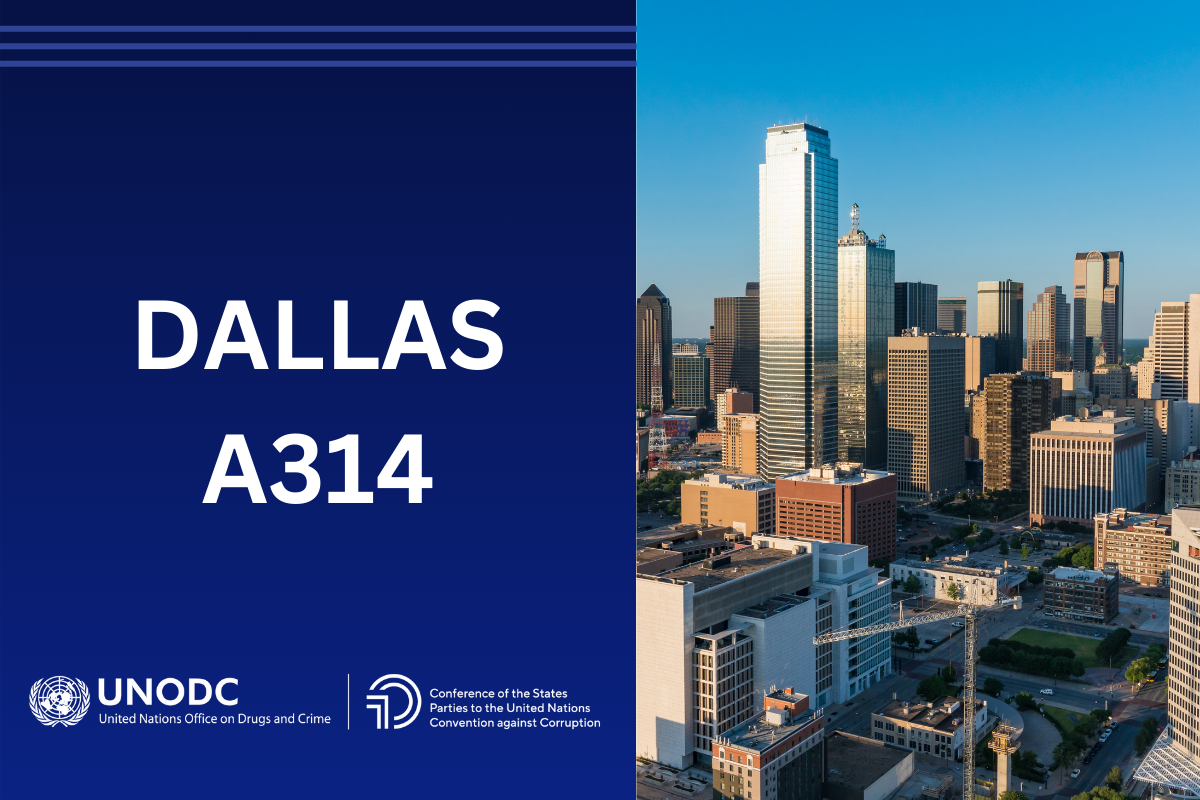Special events are meetings, presentations or panel discussions on topics that are relevant to the work of the Conference of the States Parties (CoSP) to the United Nations Convention against Corruption and that are held outside the formal proceedings. Whilst the organization of these meetings is coordinated and facilitated by the secretariat, the sole responsibility for the content of these events (including promotional materials and the events themselves) as well as for the related technical arrangements rests with the organizers.
These events are open to registered CoSP10 participants. The links for online participation in each event can be found in the INDICO platform to which registered participants have access.
The organizations of the United Nations system are committed to enabling events in which everyone can participate in an inclusive, respectful and safe manner. Events facilitated by the UN system are guided by the highest ethical and professional standards, and all participants are expected to behave with integrity and respect towards all participants attending or involved in the events.
Guidelines for special events | Information for participants: English - Arabic - Chinese - French - Russian - Spanish
.
All times below are Atlanta time (EST). The image indicates the room name and number at the Georgia World Congress Center.

The event discussed how corruption affects the environment. A high-level event and presentation of research findings set the scene for a discussion on the role of corruption in forest loss and exploitation of minerals, and the good practices and emerging opportunities to address such corruption.
Organizers: Angola, Belgium, Brazil, France, Germany, Liechtenstein, Malawi, Namibia, Norway, Peru, United States, UNDP, UNODC, Basel Institute on Governance, Environmental Investigation Agency, FACT Coalition, Extractive Industries Transparency Initiative, Natural Resource Governance Institute (NRGI), Nature Crime Alliance, Pan African Network for the Conservation of Africa's Natural Resources, Transparency International, UNCAC Coalition, Wildlife Justice Commission, World Resources Institute, World Wildlife Fund

Effectively addressing transnational corruption requires a global community of anti-corruption professionals. The GlobE International Cooperation Day offered insights on the collaboration between networks, authorities and practitioners united in the collective effort to counter corruption.
Organizer: GlobE Network
Co-organizers: China (Hong Kong Special Administrative Region of the People's Republic of China), France, Israel, Italy, United Kingdom, United States of America, Basel Institute on Governance, Conference of Ministers of Justice of the Ibero-American Countries, International Anti-Corruption Coordination Centre, Network of Corruption Prevention Authorities, OECD

Against the backdrop of UNCAC’s 20th anniversary, this event examined the implementation of article 11 on judicial integrity to date, assessing achievements, addressing challenges, and exploring emerging areas.
Organizers: UNODC, Council of Europe, American Bar Association, Fundación Ciudadanía y Desarrollo

Anti-corruption in conflict/peace processes from three different perspectives: (1) the gender & women, peace and security perspective; (2) the human impact and defence and security perspective; and (3) the citizen perspective from fragile/conflict affected states.
Organizers: Canada, Centre de Recherche sur l’anti-corruption, Transparency International Defence & Security, U4 Anti-Corruption Resource Centre
Co-organizer: United States Department of State

The event highlighted global progress and relevant standards – including reviews of such standards - on beneficial ownership transparency for countering corruption and illicit financial flows. Speakers discussed the future of beneficial ownership reforms.
Organizers: UNODC (Corruption and Economic Crime Branch, Organized Crime and Illicit Trafficking Branch), UNODC Regional Office for Southeast Asia and the Pacific, Open Ownership, Tax Justice Network Africa, Transparency International

Participants joined a 50-min session of joy and deep breathing laughter. They learned how laughter programmes enliven training events, and are proven to reduce stress, boost overall health, and enhance teamwork and bonding. Created in India - now 20,000 laughter clubs in 120 countries!
Organizer: Repatriation Group International

An introduction to Ukraine’s approaches to managing global crises through integrity ecosystem, digitalization and multi-stakeholder coalitions.
Organizers: National Agency on Corruption Prevention of Ukraine, Transparency International Ukraine
Co-organizers: Basel Institute on Governance, East Europe Foundation, Institute of Legislative Ideas, TAPAS Project

The event discussed how anti-corruption, transparency and accountability initiatives can be integrated into health systems; presented lessons from the COVID-19 pandemic; discussed approaches to translate the main principles of good governance into action in health systems; and presented country examples.
Organizer: Global Network for Anti-Corruption, Transparency and Accountability in Health (WHO)
Co-organizers: Center for International Private Enterprise

When democracies face new challenges, the bottom-up involvement of citizens in anti-corruption monitoring is a crucial mechanism to support and guide decision makers, revitalizing citizens' participation in the public sphere. The event provided an overview of experiences in civic monitoring.
Organizer: Libera Associazioni Nomi e Numeri Contro le Mafie
Co-organizer: University of Pisa

The Gulf region plays a vital role in combating corruption by enforcing law, investigating corruption-related offences, conducting preventive measures, raising awareness and collaborating with international partners to ensure security and integrity in the region.
Organizer: Gulf Cooperation Council

This event focused on national-level challenges and lessons in building beneficial ownership frameworks. It shared first-hand experiences and successful strategies and highlighted the importance of standardized data and collaboration among governments, civil society, and regional bodies.
Organizers: Nigeria, UNODC (Corruption and Economic Crime Branch, Organized Crime and Illicit Trafficking Branch), UNODC Regional Office for Southeast Asia and the Pacific, Open Ownership, Tax Justice Network Africa, Transparency International